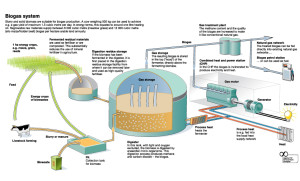Bioenergy – applying proven technology
AcrEnergy’s plants are constructed using proven, modern technology. We work in the bio energy sector and in recent years we have been focusing on biogas.
Biogas is gaseous fuel, predominantly methane, produced by the fermentation of organic matter, also referred to as anaerobic digestion (AD).
This gas allows for two types of energy generation:
- burn it in an engine to generate electricity as well as heat, or
- upgrade it to produce Biomethane or Renewable Natural Gas
making biogas a viable and proven alternative to fossil-based natural gas.
It depends on the infrastructure and local energy demand AcrEnergy can work with both types of energy generation.
The plant itself becomes self-sustainable by using a fraction of its own produced gas for its onsite power and heat demand.


